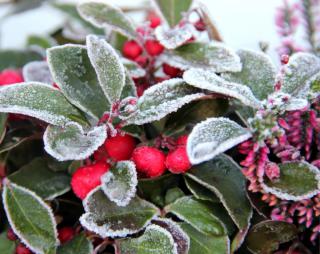

Don’t leave your garden boxes and pots empty during the cold season: many plants will let you landscape your balcony with plants in winter.
Finding which plants resist the cold in winter is the key to growing a green winter balcony. Let’s take a look at which ones do best, how to arrange and protect them from freezing drafts.
Camellia, winter jasmine, hellebore, cyclamen… Certain flowers are able to brave the frost to put on a show with winter flowers. If you’ve got a green thumb, it would be a shame to waste it over the winter. Add those plants to pot arrangements with a few evergreen plants that share the same needs (type of soil, minimum temperature…).
If you would rather have plants that are really easy to grow, forget the flowers altogether. They tend to still be quite vulnerable to the cold and to winter drafts. Best play around with shades of green, sizes and shapes with evergreens such as ivy, bamboo, boxwood, pieris… and remember to check all the small conifers.
To add spots of color, try planting winter heather, the most hardy of all flower plants, and also berry shrubs such as American wintergreen, skimmia or holly. Take note that skimmia must be brought indoors if temperatures drop below 40°F (5°C).
Either purchase your holly with berries (female specimen) or buy a self-pollinating one like ‘JC van Tol’ or ‘Alaska’ to ensure you’ll have fruits. For the American SouthEast, why not go for dwarf yaupon holly which is native to the area?
Grasses (fescue, carex) will give volume to the arrangement, and ornamental cabbage will draw eyes for uniqueness.
 Select plastic for your pots and garden boxes, it has the advantage of not deteriorating when it freezes. You can hide the plastic with wooden boxes. Provide for a depth of at least 16 inches (40 cm) for small shrubs. Shown here, pernettya with frosty leaves.
Select plastic for your pots and garden boxes, it has the advantage of not deteriorating when it freezes. You can hide the plastic with wooden boxes. Provide for a depth of at least 16 inches (40 cm) for small shrubs. Shown here, pernettya with frosty leaves.
Plant very densely (the plants aren’t in their vegetation phase), in special balcony plant soil mix. Remember to layer along the bottom of the pot something for drainage (clay pebbles and garden textiles) because stagnant water and cold is not a good pair. Similarly, slide a separator between your pot arrangements and the floor, to isolate them from the cold and avoid having them wallow in puddles in case of rain.
Check that the garden boxes aren’t on the path of drafts, behind wind-breakers. Also, have a few pieces of winterizing fleece at hand, like bubble wrap or Styrofoam that will be useful in case of deep cold.
Laure Hamann
I have a big balcony which is partly covered. I want to plant small plants in winter. How to overcome chilly wind and snow? Can I use green house made by Polythene sheet?
Hi Farha! From a practical point of view, yes, it’s perfectly possible to use polythene sheets to make your greenhouse – check other options you might want to choose from right here: how to choose your greenhouse.
However, for balconies, it’s very important to check the rules of your building association: usually there are limits to how much a balcony can be “added to” in terms of building structures and such. Sometimes they’re not designed to withstand efforts that result from wind blowing against a closed panel, the railings might fail, etc… So don’t spend anything before you’re sure you’re allowed to do it! I have seen balconies in modern buildings collapse because they had been modified, and it had dramatic consequences which I wouldn’t wish on anyone!